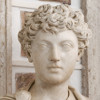“ Others, as many as take pleasure in their trade and profession, can even pine themselves at their works, and neglect their bodies and their food for it; and doest thou less honour thy nature, than an ordinary mechanic his trade; or a good dancer his art? than a covetous man his silver, and vainglorious man applause? ”
Marcus Aurelius, Meditations (c. 170 - 180). copy citation
| Author | Marcus Aurelius |
|---|---|
| Source | Meditations |
| Topic | food pleasure |
| Date | c. 170 - 180 |
| Language | English |
| Reference | |
| Note | Translated by Meric Casaubon |
| Weblink | https://en.wikisource.org/wiki/Marcus_Aurelius_Antoninus_-_His_Meditatio... |
Context
“But thou guest beyond thy stint, and beyond that which would suffice, and in matter of action, there thou comest short of that which thou mayest. It must needs be therefore, that thou dost not love thyself, for if thou didst, thou wouldst also love thy nature, and that which thy nature doth propose unto herself as her end. Others, as many as take pleasure in their trade and profession, can even pine themselves at their works, and neglect their bodies and their food for it; and doest thou less honour thy nature, than an ordinary mechanic his trade; or a good dancer his art? than a covetous man his silver, and vainglorious man applause? These to whatsoever they take an affection, can be content to want their meat and sleep, to further that every one which he affects: and shall actions tending to the common good of human society, seem more vile unto thee, or worthy of less respect and intention?”
source


